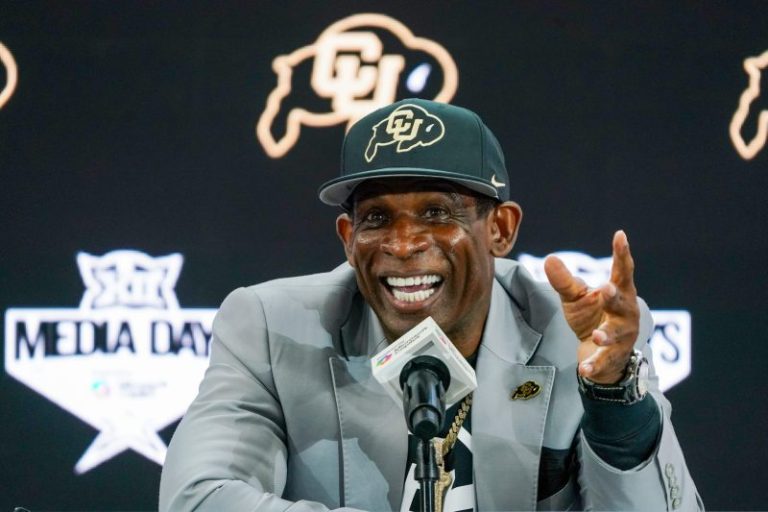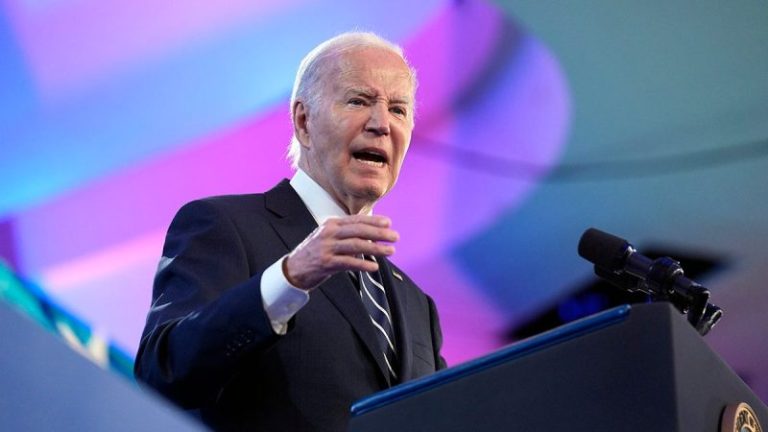Colorado, Oklahoma State, Kansas, West Virginia, Houston, TCU, Arizona and Utah coaches and players participated in the media event at The Star in Frisco, Texas, after Arizona State, Iowa State, BYU, Cincinnati, UCF, Baylor, Texas Tech and Kansas State conducted interviews on Day 1.
Rich Rodriguez made his return to West Virginia, after last coaching the program in 2007. The Mountaineers coach left what was a perennial BCS bowl contender and has since seen varying levels of success at Michigan, Arizona and Jacksonville State — though none of it as prevalent as his first stint in Morgantown.
Colorado coach Deion Sanders brought the juice, as always, noting the Buffaloes still haven’t named a starter between first-year Liberty transfer Kaidon Salter and high-end freshman recruit Julian Lewis.
Here are the highlights from Day 2 of Big 12 media days, which concluded the event in 2025.
Big 12 media days live updates
Deion Sanders talks depth of Big 12
Deion Sanders predicts the Big 12 champion to have at least two losses this season, due to the depth of the conference that’s expected in 2025.
‘I’m going to go on record saying, whoever wins the Big 12 is probably going to lose two games,’ he said. ‘It’s going to go down to the end, like it was last season.’
Deion Sanders says Colorado is improved from 2024
Deion Sanders tells ESPN he thinks Colorado has a better team than last year, despite losing quarterback Shedeur Sanders and Heisman Trophy winner Travis Hunter.
‘They were great players. We have a better team,’ Sanders said. ‘It’s a difference between great players and a great team. We have a better team, but we can never replace those types of players. It might take three players on offense to replace a Travis Hunter. It might take two players to replace a Shedeur Sanders, and that’s what we brought here.
‘We feel like we have a better defense for sure (and) a better offense more understanding of the scheme.’
Deion Sanders says Colorado has QB competition
Deion Sanders says he’s unsure who will start at quarterback between Liberty transfer Kaidon Salter and true freshman Julian Lewis, who both were brought to Big 12 media days.
‘We brought both of them because I don’t know which one is going to start,’ Sanders said.
Deion Sanders declines to comment on health
Deion Sanders, who was absent from spring camp due to an undisclosed health issue, declined to comment on his health status at Big 12 media days on Wednesday, July 9.
‘I’m really not going to tell you much,’ he said. ‘I’m not going to talk about my health, I’m here to talk about my team.’
Sanders also said: ‘I’m living good. I’m living lovely. Not a care in the world.’
Deion Sanders arrives at Big 12 media days with Michael Irvin
Deion Sanders arrives at Big 12 media days alongside his former Dallas Cowboys teammate Michael Irvin. Coach Prime is scheduled to meet with the media in a few minutes in Frisco, Texas.
Kyle Whittingham: ‘Couldn’t step away’ after ‘disappointing’ 2024 season
Entering his 21st season at Utah, Kyle Whittingham has been around the block a time or two in college football. The Utes looked to be positioned to win the Big 12 last season after being picked first in the conference’s preseason poll; however, that didn’t turn out to be the case. After starting the season 4-0, the Utes finished 5-7 overall — the program’s first losing season since 2013 — and lost seven of their final eight games.
He announced his return to Utah in December and appears to be energized for the 2025 season based on his comments at Big 12 media days. Whenever Whittingham decides to retire, Utah defensive coordinator Morgan Scalley will take over the helm of the program, as Scalley is the current coach in waiting.
‘The bottom line and the final analysis was I couldn’t step away on that note,’ Whittingham told ESPN at Big 12 media days on July 9. ‘It was too frustrating, too disappointing. As much as college football has changed with all the other factors that might pull you away, that was the overriding reason: that’s not us, that’s not who we are. It just left a bad taste in my mouth. I did not want to miss the opportunity to try to get that taste out.’
Julian Lewis, Colorado arrives at Big 12 media day
A new era of Colorado football is in store in Boulder for Deion Sanders and the Buffaloes, as Travis Hunter and Shedeur Sanders are off to the NFL with the Jacksonville Jaguars and Cleveland Browns, respectively. Headlining the group of Colorado players at Big 12 media day is freshman quarterback Julian Lewis, who flipped his commitment from USC to Colorado back in November.
Lance Leipold says Jalon Daniels is healthy
Kansas football quarterback Jalon Daniels was limited this spring due to injury and has dealt with injury issues earlier in his college career, but coach Lance Leipold reiterated that Daniels is healthy and through that adversity has always remained the same guy. Those positive, consistent qualities Daniels has are things the rest of the locker room respects. With Daniels leading the way, the Jayhawks have the potential to have a potent offense if everyone is playing well.
Of course, KU has to replace former running back Devin Neal. Neal was drafted into the NFL by the New Orleans Saints. But Kansas should have a veteran duo of Daniel Hishaw Jr. and Leshon Williams it can rely upon at that position.
— Jordan Guskey, The Topeka Capital-Journal
Rich Rodriguez running throwback offense
Rich Rodriguez, who was hired for his second tenure at West Virginia in the offseason, said he’s set to run a similar offense to when he led some dominant offenses for the Mountaineers from 2001-07.
“It was more fun 20 years ago when everyone wasn’t running tempo and was not prepared for it.’
Mike Gundy reflects on unknowns for Oklahoma State
Oklahoma State coach Mike Gundy is nearing the start of a preseason camp in which more than half the players on his roster are in their first season with the Cowboys.
“The offseason for us has been crazy,” Gundy said. “Whenever I used to go on vacation in July, I’d have a really good idea of who our two-deep was gonna be, and in most cases, who the starting quarterback was gonna be.
“I’m gonna try to go on vacation in a week or so, and I’m not sure that I know who will be the starters in eight of the 22 spots, not counting special teams. Coaches understand that it’s gonna have to happen faster in August than it ever has before, so we can get established, so we can create some identity, hopefully develop some team chemistry and get ready to play in the first game.”
Of the 114 players on the roster OSU released ahead of Big 12 media days, 62 are first-year Cowboys. And that’s in addition to a coaching staff turnover that resulted in 12 new offensive and defensive assistants hired over the winter.
— Scott Wright, The Oklahoman
Oklahoma State QB situation still in competition
Mike Gundy says Oklahoma State is still figuring out its starting quarterback for 2025, whether it’s Zane Flores or Hauss Hejny, who transferred from TCU in the offseason.
Neither quarterback have taken a snap for the Cowboys.
Gundy also said Oklahoma State has 35 new players, 18 of which via the transfer portal.
Cam Smith says Oklahoma State has chip on shoulder
Oklahoma State defensive back Cam Smith says the Cowboys are being overlooked after their 3-9 finish last season. No Oklahoma State players appeared on the preseason All-Big 12 team.
‘I feel like we are, as a team playing with a chip on our shoulder,’ he said. ‘I feel like everybody is kind of overlooking Oklahoma State based on our season we had last year. We kind of don’t want to focus on the media too much, just kind of focus on what we got going on.’
Mike Gundy reacts to video game depiction
‘That for sure says I have a full head of hair,’ Gundy said. ‘They got me all muscled up, I’m not that muscled up.’
Willie Fritz with high praise for Conner Weigman
Houston coach Willie Fritz expects new quarterback Conner Weigman to be one of the best quarterbacks in the Big 12 this season after transferring from Texas A&M.
‘I think he can be a top quarterback in the Big 12,’ Fritz said via ESPN. ‘I think Conner is really excited for this fresh start.’
Fritz also said the former five-star quarterback was clocked at 21 mph this offseason.
Colorado’s pair of new QBs in the building
Projected starter Kaidon Salter, a transfer from Liberty, and blue-chip freshman Julian Lewis, are both at The Star in Frisco for Big 12 media days. Here’s the duo checking in:
Big 12 partners with WWE
The Big 12 announced a partnership with WWE on Wednesday, July 9, which brings Friday Night Smackdown events to conference markets in 2025.
Here is the full list of dates for Friday Night Smackdown events in Big 12 cities this season:
Friday, Aug. 22: Iowa State vs. Kansas State (Dublin, Ireland)
Friday, Oct. 3: Iowa State at Cincinnati (Cincinnati)
Friday, Oct. 24: Houston at Arizona State (Tempe, Arizona)
Friday, Oct. 31: Cincinnati at Utah (Salt Lake City)
Big 12 media days schedule, lineup
Here’s the full lineup of participants for Day 2 of Big 12 media days, which is scheduled from 11:30 a.m. to 4 p.m. ET.
Arizona
QB Noah Fifita
OL Rhino Tapa’atoutai
DL Tre Smith
DB Treydan Stukes
DB Dalton Johnson
DB Genesis Smith
Colorado
QB Julian Lewis
QB Kaidon Salter
OL Jordan Seaton
DB DJ McKinney
K Alejandro Mata
Houston
WR Mekhi Mews
WR Stephon Johnson
DL Carlos Allen Jr.
DB Latrell McCutchin Sr.
Kansas
QB Jalon Daniels
C Bryce Foster
DE Dean Miller
DT D.J. Withers
Oklahoma State
TE Josh Ford
DT Iman Oates
DB Cam Smith
TCU
QB Josh Hoover
WR Eric McAlister
OL Coltin Deery
LB Devean Deal
LB Namdi Obiazor
DB Bud Clark
Utah
QB Devon Dampier
OL Spencer Fano
DB Smith Snowden
LB Lander Barton
West Virginia
WR Jaden Bray
OL Landen Livingston
DL Edward Vesterinen
Big 12 media days recap
Here are the highlights from Day 1 of Big 12 media days, which took place on Tuesday, July 8:
What channel are Big 12 media days on?
TV channel: ESPNU | ESPN2
Streaming: ESPN app | ESPN+ | Fubo (free trial)
Both days of the event will air live on ESPNU, with portions of the event partially airing on ESPN2, as well. Streaming options include the ESPN app (with a TV provider login) and ESPN+, which requires a subscription. Another option is Fubo, which carries the ESPN family of networks and offers a free trial.
This post appeared first on USA TODAY










